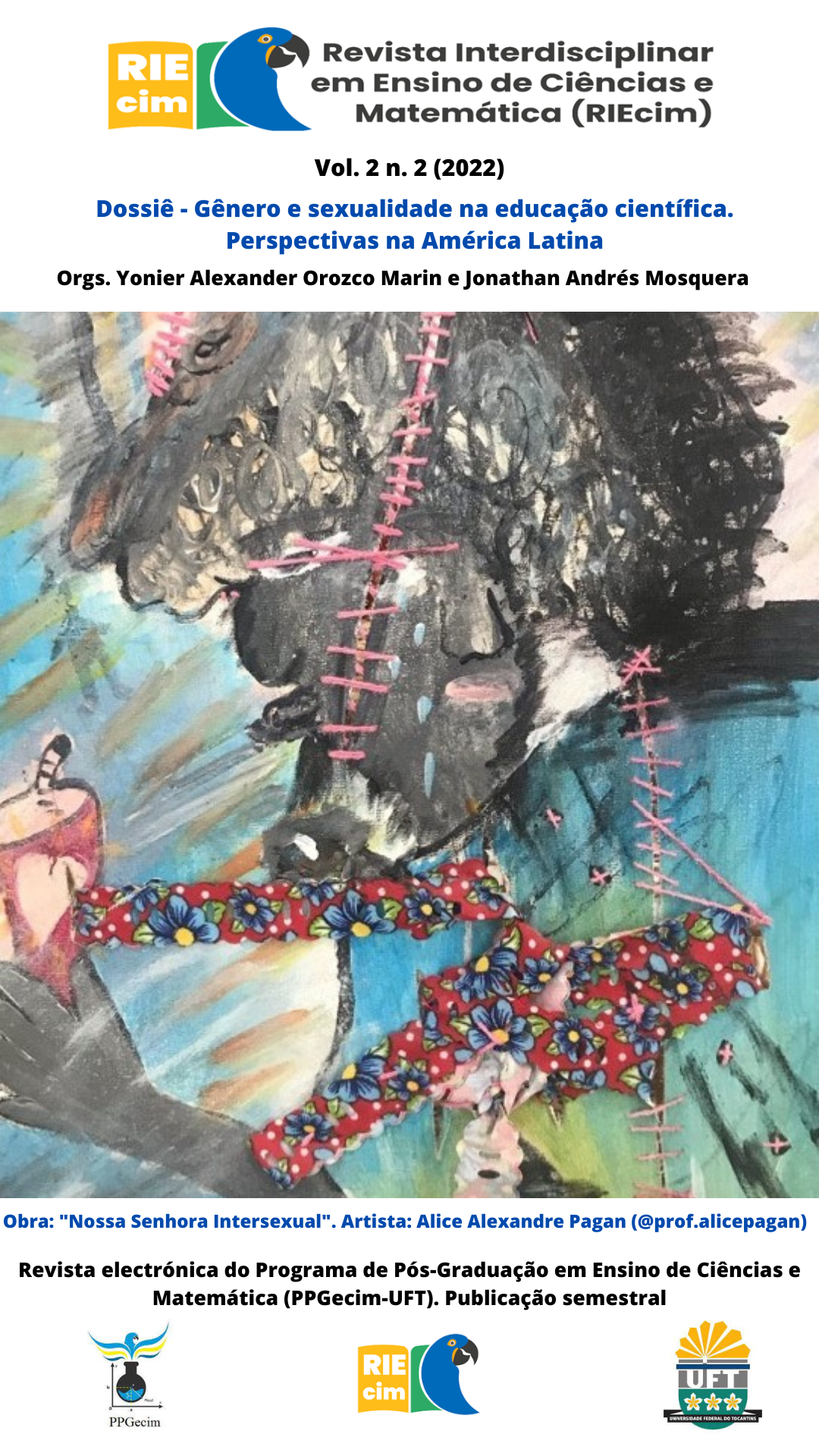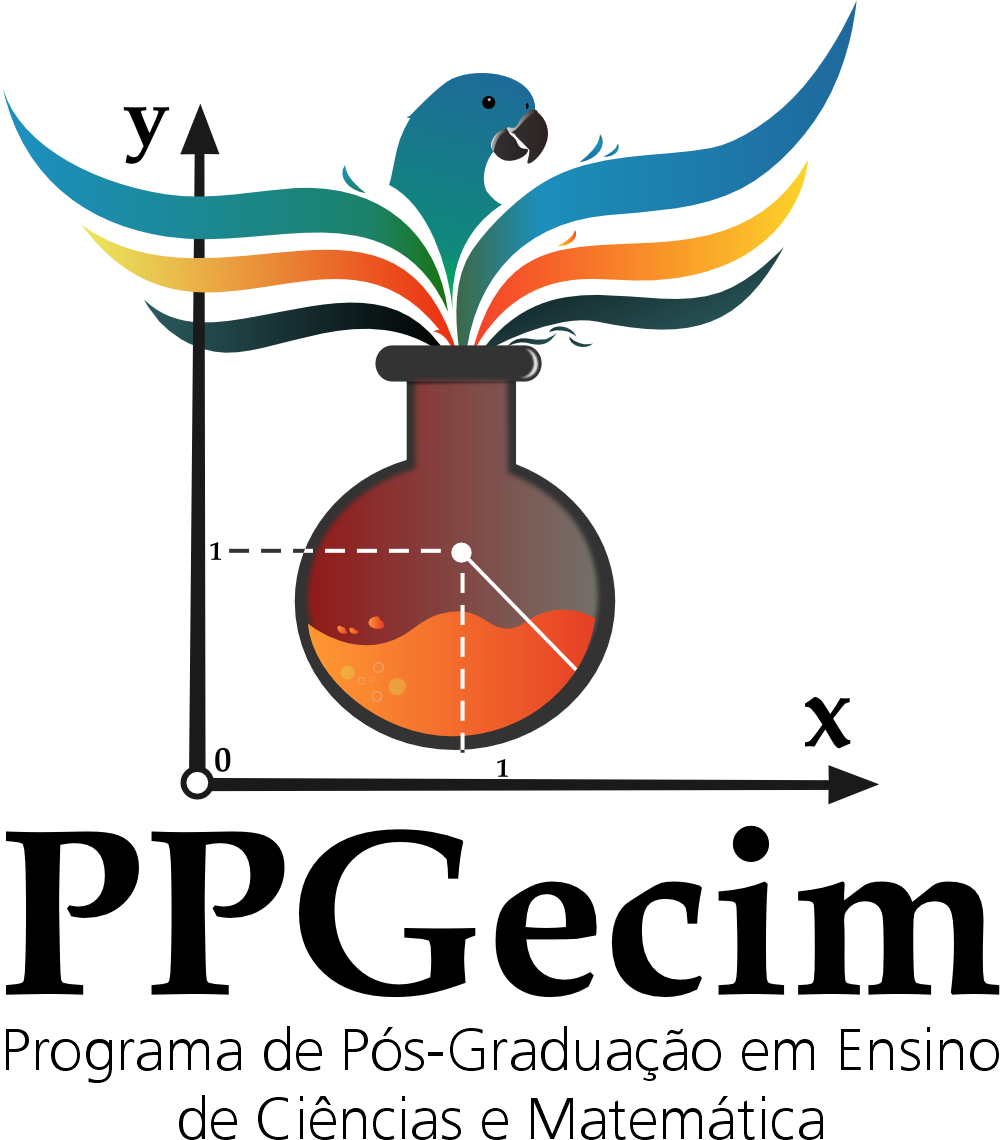"I, intersex..."
Reflections on intersexuality from the letters writing
DOI:
https://doi.org/10.20873/riecim.v2i2.14849Keywords:
Science Education, Feminist Epistemology, Sexual EducationAbstract
In this study, I analyze the construction and development of a didactic sequence on the intersexuality theme, aimed at students in the 8th year of elementary school. The elaboration and analysis of the didactic sequence were based on feminist and gender studies, with a focus on feminist biologists. The sequence's objective was to problematize the rigid male/female binary, based on the discussion of intersexuality cases. Through this pedagogical practice, I found that the students reflected on the male/female binary, whether in the intersexual anatomical-physiological study, or when they came into contact with political claims of the Brazilian intersexual movement. Finally, it is necessary to discuss more about intersexuality in science teaching, embracing intersex diversities as possibilities outside the pathological bias.
References
AINSWORTH, Claire. Sex Redefined. Nature, v. 518, 2015. Disponível em: https://www.nature.com/articles/518288a.pdf . Acesso em: 12 jun. 2022.
BASTOS, Felipe. “A diretora sabe que você está trabalhando isso na sala de aula?”: diversidade sexual e ensino de ciências. 2015. 180 f. Dissertação (Mestrado em Educação) – Pontifícia Universidade Católica do Rio de Janeiro, Departamento de Educação, Rio de Janeiro, 2015. Disponível em: 2022.https://www.maxwell.vrac.puc-rio.br/colecao.php?strSecao=resultado&nrSeq=26508@1. Acesso em: 12 jun. 2022.
BASTOS, Felipe. “Eu fico meio sem saber como eu vou falar isso assim, do nada”: currículo, diversidade sexual e ensino de biologia. In: TEIXEIRA, Pedro Pinheiro; OLIVEIRA, Roberto Dalmo Varallo Lima de; QUEIROZ, Glória Regina Pessôa Campello (Org.). Conteúdos cordiais: biologia humanizada para uma escola sem mordaça.São Paulo: Editora Livraria da Física, 2019.
BASTOS, Felipe; ANDRADE, Marcelo. “Ser mulher não tem a ver com dois cromossomos X”: impactos da perspectiva feminista de gênero no ensino de ciências. Revista Diversidade e Educação, v.4, n.8, p. 56-64, 2016. Disponível em: https://periodicos.furg.br/divedu/article/view/6740. Acesso em: 13 jun. 2022.
BRASIL. Projeto de Lei N° 2578 de 2020. 2020. Disponível em: https://www.camara.leg.br/proposicoesWeb/fichadetramitacao?idProposicao=2252276. Acesso em: 25 ago. 2022.
BUTLER, Judith. Problemas de Gênero: feminismo e subversão da identidade. 15 ed. Rio de Janeiro: Civilização Brasileira, 2017.
BUTLER, Judith. Corpos que pesam: sobre os limites discursivos do “sexo”. In: LOURO, Guacira Lopes (Org.). O corpo educado: pedagogias da sexualidade. 4 ed. Belo Horizonte: Editora Autêntica, 2018.
COELHO, Leandro Jorge; CAMPOS, Luciana Maria Lunardi. Diversidade sexual e ensino de ciências: buscando sentidos. Ciência & Educação, Bauru, v. 21, n. 4, p. 893-910, 2015. Disponível em: https://www.scielo.br/j/ciedu/a/fCSb69yzh8wDm3tWXKYsFkS/?format=pdf&lang=pt . Acesso em: 13 jun. 2022.
COSTA, Dhemersson Warly Santos; SILVA, Carlos Augusto Silva. “Que palhaçada é essa?”: um relato sobre a sexualidade no Ensino de Ciências. Diversidade e Educação, [S. l.], v. 5, n. 2, p. 96–101, 2018. DOI: 10.14295/de.v5i2.7537. Disponível em: https://periodicos.furg.br/divedu/article/view/7537. Acesso em: 25 out. 2022.
EXTRA. Em decisão inédita no Brasil, Justiça do Rio autoriza certidão de nascimento com registro de ‘sexo não especificado’. 2020. Disponível em: https://extra.globo.com/noticias/rio/em-decisao-inedita-no-brasil-justica-do-rio-autoriza-certidao-de-nascimento-com-registro-de-sexo-nao-especificado-rv1-1-24649959.html . Acesso em: 03 set. 2022.
FAUSTO-STERLING, Anne. The five sexes. The Sciences, p. 20–24, 1993.
FAUSTO-STERLING, Anne. The five sexes, revisited. The Sciences, 2000a.
FAUSTO-STERLING, Anne. The Sex/Gender Perplex. Studies in History and Philosophy of Science, v. 31, n. 4, p. 637–646, 2000b.
FAUSTO-STERLING, Anne. Dualismos em duelo. Cadernos Pagu, n.17-18, p.9-79, 2002. Disponível em: https://periodicos.sbu.unicamp.br/ojs/index.php/cadpagu/article/view/8644553. Acesso em: 13 jun. 2022.
FAUSTO-STERLING, Anne. Sex/Gender: Biology in a Social World. Nova Iorque: Routledge, 2012.
FAUSTO-STERLING, Anne. Gender/sex, sexual orientation, and identity are in the body: how did they get there? The Journal of Sex Research, p. 1-27, 2019.
FAUSTO-STERLING, Anne. Sexing the body: gender politics and the construction of sexuality. Basic Books: New York, 2020.
IMPERATO-MCGINLEY, Julianne; ZHU, Yuan-Shan. Androgens and male physiology the syndrome of 5alpha-reductase-2 deficiency. Molecular and Cellular Endocrinology, v. 1-2, n. 198, p. 51-59, 2002.
ITAÚ CULTURAL. ATIVISTAS EXPLICAM O QUE É SER INTERSEXO. Youtube, 20 set. 2018. (5 minutos e 06 segundos). Disponível em: <https://www.youtube.com/watch?v=AxgmwbPCqr0&list=LL&index=25>. Acesso em: 13 jun. 2022.
MELO, Andréa Silene Alves Ferreira. Operação “pente fino”: um levantamento das publicações sobre gênero, sexualidade e corpo nos ENPEC. In: Encontro Nacional de Pesquisa em Educação de Ciências - ENPEC, 11, 2017, Florianópolis. Anais... .Florianópolis: ABRAPEC, 2017.
MOSLEY, Michael. Guevedoces: o estranho caso das 'meninas' que ganham pênis aos 12 anos. BBC Brasil online. 2015. Disponível em: https://www.bbc.com/portuguese/noticias/2015/09/150921_meninos_puberdade_lab. Acesso em: 10 out. 2022.
NUCCI, Marina Fisher. Crítica feminista à ciência: das “feministas biólogas” ao caso das “neurofeministas”. Revista Estudos Feministas. Florianópolis, n. 26, v.1, 2018.
OLIVEIRA, Carlos Henrique. Como é ser uma pessoa intersexual? Youtube, 19 jun. 2019. (5 minutos e 27 segundos). Disponível em: <https://www.youtube.com/watch?v=qJK5hy7R7kg&list=LL&index=24>. Acesso em: 13 jun. 2022.
PINHO, Raquel; BASTOS, Felipe. Sentidos de sexualidade nos anais dos Encontros Nacionais de Ensino de Biologia (2005-2016). Ensino em Re-Vista, v. 26, n. 1, p. 82–99, 2019.
ROUGHGARDEN, Joan. Evolução do gênero e da sexualidade. Londrina: Editora Planta, 2005.
SILVA, Luciana Aparecida Siqueira; SILVA, Elenita Pinheiro de Queiroz. Diálogos entre intersexualidade e ensino de biologia. Diversidade e Educação, v. 9, n. especial, p. 576–599, 2021. Disponível em: https://periodicos.furg.br/divedu/article/view/12837. Acesso em: 12 jun. 2022.
VIEIRA, Amiel. Amiel Vieira – Todos os Gêneros (2017). Youtube, 11 maio 2018. (4 minutos e 34 segundos) Disponível em: <https://www.youtube.com/watch?v=PIHlfpfzvac&list=LL&index=20>. Acesso em: 13 jun. 2022.
Downloads
Published
How to Cite
Issue
Section
License
Copyright (c) 2022 Bruno Tavares

This work is licensed under a Creative Commons Attribution-NonCommercial 4.0 International License.
Copyright Policy
Copyrights are retained by the authors, who grant RIEcim the exclusive rights for first publication. Authors will not be remunerated for the publication of their work in this journal. Authors are permitted to enter into separate, additional contractual arrangements for the non-exclusive distribution of the work's published version in this journal (e.g., post it to an institutional repository, on a personal website, publish a translation, or as a book chapter), with acknowledgement of authorship and initial publication in this journal. The Journal's editors have the right to make textual adjustments and adaptations to conform to publication standards.
Open Access Policy
This journal provides immediate open access to its content, following the principle that freely providing scientific knowledge to the public contributes to the global democratization of knowledge. Users can read, download, copy, distribute, print, search, or use the content for any legal purpose, respecting national copyright laws and without seeking prior permission from the publisher or the author. The opinions presented in the articles are the responsibility of the authors. The Journal does not charge Article Processing Charges (APCs).
Licensing Policy - Usage License
Licensed under the Creative Commons Attribution-NonCommercial 4.0 International (CC BY-NC 4.0) License. This license allows sharing, copying, redistributing the manuscripts published in RIEcim in any medium or format. Additionally, it allows adapting, remixing, transforming, and building upon the material, as long as proper credit is given to the author and initial publication in this journal is acknowledged.


























